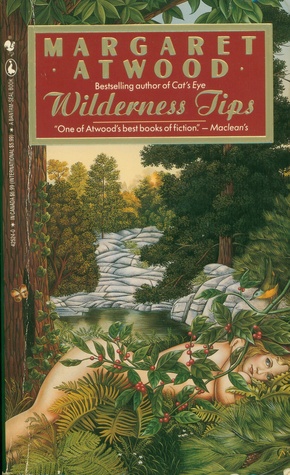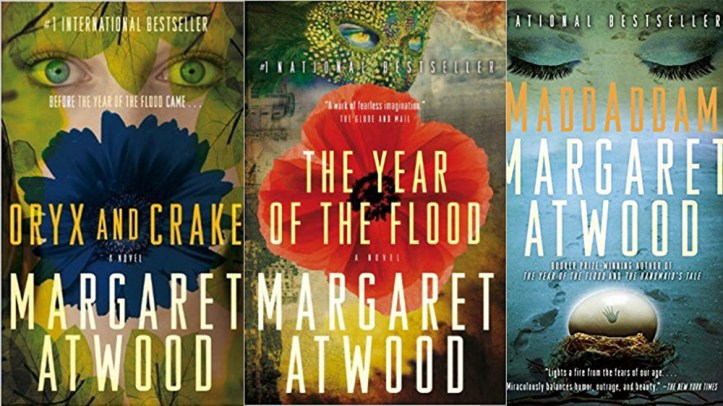Wilderness Tips is my third fiction collection of 2019! That’s. . . a small number. I read SO many short stories in grad school that I got burned out on them and have spent the last nine years reading novels and nonfiction. Margaret Atwood’s work is hit or miss for me. While I loved Oryx & Crake (I even taught the novel in a college literature course), I dragged my brain begrudgingly through Cat’s Eye. Alias Grace was good, but I read it right on the back of watching the wonderful limited series on Netflix, so that likely affected my reading.
In the heyday of short stories, back when “short story” meant a publication of around twenty-five pages, readers could expect fully-developed, richly-plotted works. Today, a short story in a new collection is typically around twelve pages; writers lean toward funky, open-ended, slice-of-life tales. Our attention spans have waned, and publishers put word and/or page count limits on what writers can submit. So it was with glee that I noted Wilderness Tips, published in 1991, contains ten short stories, each one (no surprise) about twenty-five pages.
I compared Atwood’s stories in this collection to a spinning saw blade of womanhood and stand by that. There was a focus on reproduction, whether the characters were pregnant, had ovarian cysts, missing young motherhood, or singing about menstruation products. There’s something about stories that mention women’s reproductive processes that make me warm and fuzzy. Maybe because I’ve read many stories that normalize penises as something we’re supposed to discuss. Or kneel down to. And worship. Rupi Kaur shared photos normalizing periods, but they were removed from Instagram for violating the “sexual acts, violence, and nudity” policy. Meanwhile, photos of women in highly revealing swimwear or underwear are welcome on Facebook thanks to users who don’t find the photos objectionable — only because the subjects are sexy.

Atwood also addressed sex as a bartering tool, mainly as a way to get secrets to use later against men. Does that sound devious? Sure, but in an age of men legislating women’s bodies — while not even understanding that a fertilized egg in a Fallopian tube is NOT a pregnancy — I’m all about using whatever power we have to accomplish what we need to. As Malcolm X said of oppressed people, “By any means necessary.” I’m not a violent person, nor am I malicious. But I AM angry and feeling a little guerilla. Welcome to America.
Looking at the stories in Wilderness Tips as a whole, I found the characters memorably crafted and appreciated both the Canadian outdoors as a setting (there a couple of summer camp and cabin house stories) as well as her city-dwellers (Toronto in the 1960s or 1980s, mostly). The characters and setting helped me enjoy the way a theme established early on in a story came full circle at the end. I know readers who find that method tacky, but I believe it’s the payoff at the end, as if Atwood and I shared a worthy secret.
A highly readable, highly recommended short story collection that didn’t suffer from an unevenness in quality.




If I was somewhat keen to read more Atwood before, I definitely want to now! This sounds great.
LikeLike
I recognize that my review is a lil aggressive, so thanks for still seeing all the good in there!
LikeLiked by 1 person
I still remember exactly where I was the first time I read this collection, in the attic room of an apartment I rented in my 20s, unfinished, rows of pink insulation held back by thin sheets of plastic, my bed shoved under the eaves so that I had to edge myself out backwards to avoid hitting my head when I got up, everything just a bit too warm. And i read them all in a burst, over a couple of evenings. Somehow it seemed perfect. I’d like to reread this in what I now view as more comfortable conditions!
LikeLike
All I’m picturing is Anne Frank, to be honest with you! You should definitely get a rocking recliner and rewrite your memory of Wilderness Tips 🙂
LikeLike
*giggles* Well, I guess it’s all relative. It was a room of my own, all the same!
LikeLike
I have yet to find the right Margaret Atwood book for me, but maybe I’ll give this one a try. (At least with short stories I only have to focus for a few pages!) It’s unusual to find a short story collection that doesn’t deteriorate in quality, so that’s a point in its favour.
LikeLike
Each one was even, so that’s nice. I know you like science fiction; I think Oryx and Crake would be a good pick for you, too. The first two chapters are disorienting, then you get situated and realize you’re reading flashbacks in a futuristic setting where science flourishes, and that the present is even MORE future, but not futuristic. It seems more like everything has collapsed.
LikeLiked by 1 person
I don’t read short stories more than I can help, though I’m reading a collection right now – I’ll have to check the page count, it feels more 25 than 10, so at least you get into it a bit. (Hey, BIP, on my one day in England years ago I got to sleep in an attic bedroom, the only time in my life, and nearly the highlight of my trip. We don’t do attics in Oz.)
LikeLike
Wait, why don’t you do attics in Australia? Would they simply harbor all those creatures you guys have that want to kill humans??
LikeLike
It’s definitely counter-intuitive, lots of our houses have big, high roofs, but I guess the heat is a problem. Even pull-down attic ladders are relatively unusual. I’ve looked up ‘death by redback spider’ and the last was in 1979 – all your illusions come tumbling down!
LikeLike
But you guys have those nasty honey bees, with a 9/10 on the danger scale. Also this: “Direct UV light will kill a Funnel Web spider, so the spiders need somewhere to hide during the day and have been known to consider a shoe a perfectly adequate location.” 😱
LikeLike
Honey bees aren’t a problem (except that here as in the US Monsanto is doing its best to kill them all). We do sometimes get European wasps in the eaves, which can be dangerous, especially to children. Redbacks and funnel webs both like dark corners, so be careful where you put your hands.
LikeLike
Good gravy, I put my hands everywhere, Bill.
LikeLike
Ah, see, yes: there’s something to be said for being under the eaves! (We can shove Melanie’s rocking recliner into the middle bit, where she’ll still be able to stand, if the wasps haven’t scared her off.)
LikeLike
I’m pretty much terrified of everything that flies at me except butterflies! 🤣🤣🤣
LikeLike
Thanks for sharing the “Rupi Kaur shared photos normalizing periods” article. That was fascinating. I have to admit that childbirth and periods make me squidgy and not “warm and fuzzy.” I do believe that be because pregnancy for me would be having a parasite. And periods make me think about me endometriosis. That said, I do think that discussing periods should not be taboo. It happens to about half the people on the planet at some point. I do get tired off all the penis glorification though so hooray woman power. That said, this collection is likely not for me. Arrrr!
x The Captain
LikeLiked by 1 person
One of my biggest fears from age 12-18 was that someone would hear me open the wrapper of a sanitary napkin. I’ve heard guys say things like they know when women are menstruating because they can smell it. Periods are also used to belittle the mental capacities of women and girls. To me, it’s important to talk about periods as much as possible to stop any shame associated with periods. They’re happening, all the time, everywhere you go. Sometimes suddenly, sometimes painfully, oftentimes annoyingly. I’m surprised how few places have those tampon/pad machines in the restrooms anymore. I think at the core of it I’m mad that men don’t seem to know ANYTHING about women.
LikeLike
Great review! This sounds really appealing. I’ve loved every bit of Atwood’s writing that I’ve read so far, but I read her work pretty sparsely because I don’t want to overdose and lose my appreciation. But I like short story sets that share characters and themes between pieces, and work with each other; I do want to pick up more short stories this year and haven’t read an Atwood book yet in 2019, so this collection is looking like a strong contender!
LikeLike
I’m so glad! If you like collections that share characters across the stories, I enjoyed Cul de Sac by Scott Wrobel. It’s basically domestic/household fiction from a male point of view, and each story is set in a different house in the cul de sac, so characters come back.
LikeLiked by 1 person
Thanks for the rec! That does sound like my sort of collection, I’ll have to check it out!
LikeLiked by 1 person
Haha! That “First Moon Party” video is the best!! I can’t wait to show it to my kids. 🙂
I haven’t ever read Wilderness Tips, but it sounds excellent. Great review!
LikeLike
Thanks, Naomi! Your fellow Canadian didn’t let down the good name of your country 😁
LikeLiked by 1 person
[…] relatively average week with two blog posts! On Wednesday I shared my review of Wilderness Tips, a vicious and lovely collection of short stories, including one about a woman who has an ovarian […]
LikeLike
Well, finally a short story collection you don’t feel underwhelmed by. I’ve never read any of Atwood’s works.
LikeLike
I think my problem was I just read way too many short story collections when I was in grad school that all of them failed to make an impression on me. Story after story. . .they start to blur together after a while, especially if all the collections you read come from the same time period.
LikeLiked by 1 person
Oohh! I haven’t read this one but it sounds fabulous. And i love Atwood’s focus on female reproduction too. It wasn’t until I became a Mom that I realized how important abortion is, and saw it as a human right! Ugh, all this stuff just gets me so mad, people trying to ban abortion, I imagine as an American you’re feeling it way more right now as well.
LikeLike
In INDIANA, no less. Home of Mike Pence. Blech. I’m from Michigan, typically a solid democratic state, so being in this republican wonderland has been….a pain. Just yesterday I bought some pants in the mall at Macy’s. I ran my credit card and it asked if I would like to round my purchase up to the nearest dollar to donate to The Trevor Project (created by Trevor Noah and supports LGBTQ folks). The cashier reached over the counter and pushed NO for me!
LikeLiked by 1 person
OMG what??? I would have slapped that hand away haha
LikeLike
IKR?!
LikeLiked by 1 person
[…] Melanie reviewed Wilderness Tips and reminded me why I want to explore more of Atwood’s work. […]
LikeLike